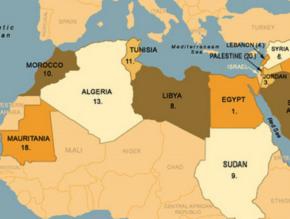|
World Jewish News

Map of the countries - members of the Arab League
|
Arab League hails dawn of 'new era' of revolutions against tyranny
03.03.2011, Israel and the World Arabs ministers stood in silent respect for protesters killed while demonstrating against governments across the region at a meeting on Wednesday that injected new life into the moribund Arab League.
"It is the first meeting of a new era, in the era of revolution," Secretary-General Amr Moussa told officials representing some of the rulers that protesters have taken to the streets to complain about.
The silent memorial was unprecedented at Arab League talks.
"The Arab nation has triumphed over itself," he said. "While I must mourn the lives of the martyrs in Egypt and Tunisia, I must salute all revolutions seeking freedom and peace."
"The Arab people will stand against tyranny because it is painful, rejected and insulting," said Moussa, a candidate for the Egyptian presidency from which Hosni Mubarak was toppled last month after 30 years of iron rule.
The Egyptian foreign minister, Ahmed Aboul Gheit, who until a few weeks ago worked for Mubarak, said the 18-day uprising that removed his former boss was "the most spectacular in history".
Moussa himself worked as Egypt's foreign minister under Mubarak before taking up his role at the League in 2001.
An Omani minister, representing a government that is still facing protests, said the meeting was "the first in the era of the new Arab renaissance". He spoke of "an earthquake" and change "to be carried out by the youth of this nation".
The last time Arab officials met at ministerial level Tunisia's long-time leader Zine al-Abidine Ben Ali had just been toppled by the uprising that set off mass protests across the region governed for decades by the same monarchs and presidents.
That revolt touched off protests that have since swept countries from Bahrain to Algeria, toppling the Egyptian president in spectacular style and now threatening Muammar Gadhafi's four-decade-reign as leader of Libya.
The barrier of fear had been smashed, said Moussa, adding that "this was the greatest achievement ever".
Libya's seat was empty, its membership of the 22-member Arab League suspended in protest at Gaddafi's handling of the uprising that is by far the bloodiest yet. The foreign ministers of Algeria, Sudan, Syria and Jordan all praised the Arab people.
The foreign minister of Iraq urged Arab officials to learn from his country's experience of rebuilding after U.S.-led forces toppled Saddam Hussein in 2003.
Hoshiyar Zebari said recent protests in Iraq were driven by social and economic rather than political grievances.
"The Arab world stands faced with the biggest test in its history," said Zebari.
"General freedom and social equality are the real guarantee for any regime that wishes to maintain the trust of the masses," he said, delivering the opening remarks of the session.
He then called the officials to read the Fatiha, or the opening chapter of the Koran traditionally read at funerals, as they stood for a moment of silence for "the martyrs in Tunisia, Egypt, Libya and a number of Arab states who were martyred for reform and change".
During the summit, the Arab League also called on Gadhafi's government to halt attacks against Libyans and said it would consider imposing a "no-fly" zone over the country which has been suspended from the organization.
The League ejected any direct outside military intervention in Libya, where Gadhafi is trying to put down a revolt threatening his four decades in power. They reiterated their condemnation of his use of force.
"We have to save the Libyan people and that is why we are trying to call on Libya and the Libyan authorities to cease those attacks against the Libyan population," Moussa told reporters during a closing news conference.
"The Arab League will not stand with its hands tied while the blood of the brotherly Libyan people is spilled," Moussa said.
Haaretz.com
|
|
